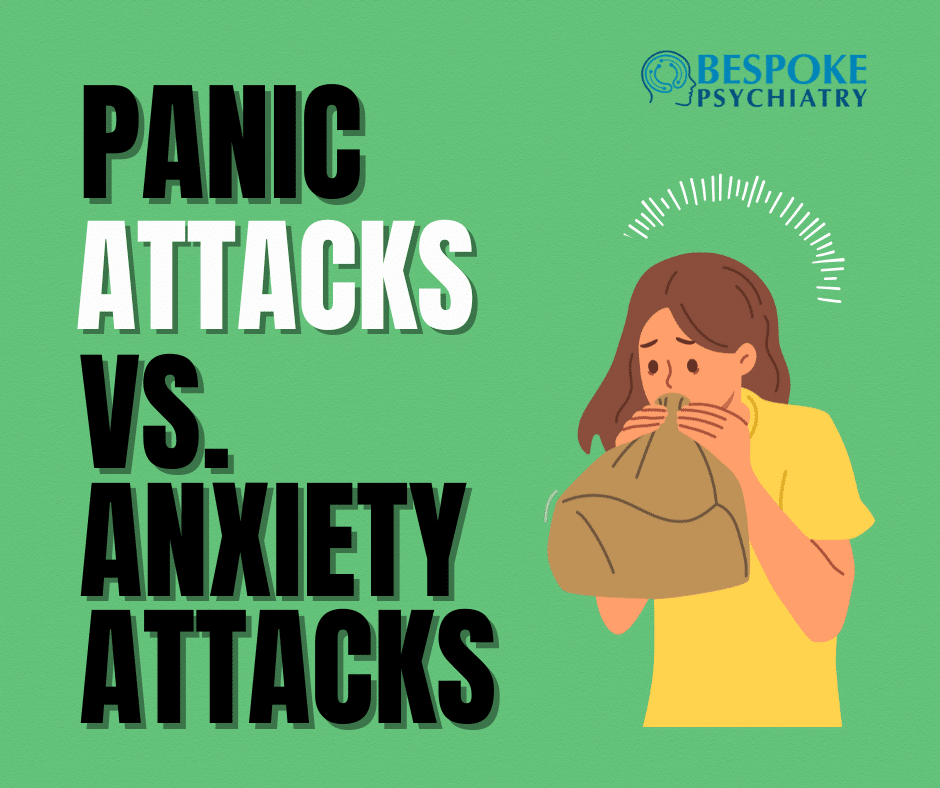
Panic vs. Anxiety: What You Need to Know
Have you ever felt your heart suddenly race or found yourself trapped in a relentless cycle of worry? Panic and anxiety attacks might seem similar, but they have key differences. Knowing what you’re dealing with can help you manage symptoms and find the right support. For more resources and mental health support, or to schedule a consultation, visit Bespoke Psychiatry’s website.
What’s a Panic Attack?
Panic attacks hit fast and hard. One moment you’re fine, the next your heart is pounding, and it feels like something terrible is about to happen. They come suddenly, often without warning, and bring intense physical symptoms like dizziness, shortness of breath, and chest pain. You may feel detached from reality or yourself, convinced that you’re losing control. These attacks usually peak within minutes and then pass, but the experience can be terrifying.
What’s an Anxiety Attack?
Anxiety attacks build up over time and are usually tied to ongoing stress or worry. Unlike panic attacks, they don’t come out of nowhere. Instead, you might feel a growing sense of nervousness, muscle tension, restlessness, and difficulty concentrating. Anxiety attacks don’t always have a clear peak and can last for hours or even days, creating a persistent feeling of unease.
Panic vs. Anxiety: Key Differences
Panic attacks happen suddenly and feel overwhelming, while anxiety attacks develop gradually and are often linked to long-term stressors. Panic attacks bring intense physical symptoms that peak quickly and then fade, whereas anxiety attacks cause persistent worry that lingers for a longer period. The sense of fear in a panic attack is extreme and feels uncontrollable, while anxiety attacks create a sense of dread that builds over time.
How to Cope
When experiencing a panic attack, focusing on deep breathing can help slow your heart rate and bring a sense of calm. Grounding techniques, such as naming objects around you or feeling the texture of something nearby, can help you reconnect with reality. Remind yourself that panic attacks are temporary, no matter how intense they feel. Moving to a quiet space, if possible, can also help you regain control.
Managing anxiety attacks requires identifying what’s triggering your stress. Regular movement, like going for a walk or exercising, can help release built-up tension. Relaxation techniques such as meditation or progressive muscle relaxation can ease the intensity of anxious thoughts. Watching your caffeine and alcohol intake can also make a big difference, as both can worsen anxiety. Talking to someone—a friend, a mental health provider, or support group—can provide relief and help you process your emotions. Click HERE to become a new patient.
When to Seek Help
If panic or anxiety attacks are interfering with your daily life, professional help can make a difference. A psychiatrist can assess your symptoms and recommend treatment options like therapy, medication, or lifestyle adjustments. You don’t have to go through it alone.Panic and anxiety attacks are challenging, but they don’t have to control you. The more you understand them, the better you can manage them. If you’re struggling, don’t hesitate to seek support—you deserve to feel better. Contact Bespoke Psychiatry today to book an appointment with one of our expert providers or psychiatrists and start your journey toward a happier, healthier you. Personalized mental health care can provide the targeted support necessary to help you feel better and regain control of your life.



